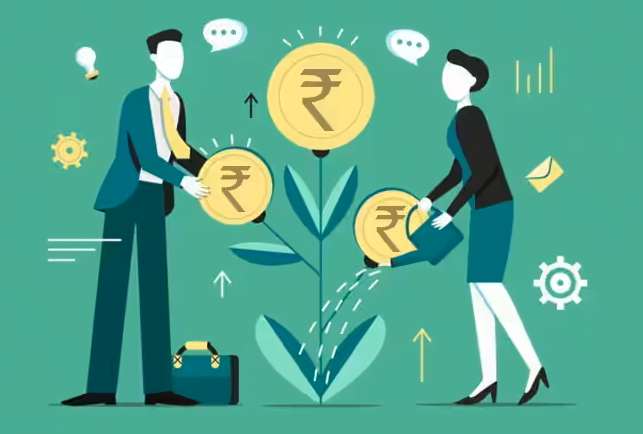
Fueling Entrepreneurship: Indian government's commitment to startups
♠ Startups are projected to contribute 4-5% to GDP in the next five years and have already generated over 7.6 lakh jobs.
♠ Startups offer rapid career advancement, with top-level managers earning an average annual pay of ₹11.2 lakhs and mid-career managers earning around ₹10.7 lakhs per year.
♠ Startups create additional businesses and contribute to tax revenues through corporate taxes, payroll taxes, and other forms of taxation
♠ Startups drive innovation, attract foreign direct investment, and contribute to increased foreign exchange reserves, export earnings, and a country’s international prestige.
♠ Startups address migration issues, create opportunities within local communities, and offer innovative solutions to societal challenges, fostering inclusive and prosperous futures.
With the vision of making ‘Atmanirbhar Bharat’ government launched the Startup India initiative in 2016 to promote self-sufficiency among the people, to build a robust culture of job creators instead of seekers through promoting startup culture in the country. Since then, you might have noticed the government has also initiated a lot of funding programs. To date, there are over 43 active funding schemes for promoting start-ups that account for more than Rs. 10,945 cr under the umbrella of various central ministries.
Have you ever wondered why the government is investing so much money in startups or in promoting entrepreneurship?
Connecting it with employment, innovation, and technological advancement makes it a significant aspect to consider. However, like a coin, there are multiple facets to it.

First and foremost, startups’ contribution to GDP is going to be 4-5% in the next 5 years. This contribution will be the result of the revenue generated by startups through sales, exports, services, and employment, all of which contribute to the overall economic output. It is important to note that their growth potential, coupled with job creation, where over 7.6 lakh jobs were generated through startups as of July 2022, stimulates consumer spending and drives economic activity across various other sectors as well. That is the main reason why so many resources are allocated by the government to support startups in their growth and sustainability.
Now, what more?
The rise in average salaries. When it comes to top-level managers in startups, the average annual pay stands at a staggering ₹11.2 lakhs. Impressive, right? What makes it even more intriguing is the relatively short time it takes to reach this level, often within just three years. These managers have hustled their way up the ranks, proving their worth in the fast-paced world of startups. On the other hand, we have mid-career managers with 4-9 years of experience, who earn an average salary of around ₹10.7 lakhs per year. These managers have climbed the corporate ladder over a more extended period. This shows that the startup ecosystem not only offers exciting opportunities for rapid career advancement but also provides competitive salaries.
Government spending is not random. Startups or any new company that emerges, leads to the generation of additional 3x businesses. These startups generate tax revenues for the government through many forms, such as corporate taxes, payroll taxes, and other forms of taxation. About 107 startups became unicorns until now. The success of these 107 unicorn startups brings not only financial gains for the companies themselves but also positive implications for the government’s revenue. As these startups grow, they contribute a larger share of tax revenue, which can be used to fund public services, infrastructure development, and other government initiatives. This cycle of taxation and reinvestment supports overall economic development and improves the standard of living for citizens.
Furthermore, this year has witnessed a significant surge in the filing of applications for various intellectual property rights (IPRs). The number of applications filed (568049) has been higher as compared to the previous year (528471), exhibiting an overall increase of 7.5%. Through the promotion of innovation, the government safeguards patents & Intellectual property rights (IPR), which are crucial assets to be protected.
By ensuring this, governments incentivize academic and research institutions to invest in research and development, which drives technological advancements. Resultantly, the culture of innovation will be fostered, and India will be able to attract foreign direct investment (FDI). The increase in foreign exchange reserves from USD 532.66 billion to USD 578.45 billion during the half-year period under review is a positive sign for the economy and the crucial role played by startups in driving this economic growth and bolstering the country’s financial standing. Startups have emerged as key contributors to export earnings, foreign direct investment, and job creation, which ultimately leads to increased revenue generation and foreign exchange inflows. These factors contribute to a country’s international prestige. It opens doors for various cross-country opportunities and for knowledge exchange, further fueling economic growth. A vibrant startup landscape can attract global attention and position the country as a hub for innovation and entrepreneurship.
The government places a strong emphasis on startups due to their significant role in generating employment and solving societal issues. They understand that by promoting entrepreneurship at the grassroots level, they can address the problem of migration and create opportunities within local communities. State governments play a crucial role in empowering local entrepreneurs, which in turn contributes to regional development, job creation, and overall economic growth. Startups have the potential to not only provide employment opportunities but also offer innovative solutions to various social challenges. By supporting and nurturing startups, the government ensures a more inclusive and prosperous future for local communities and the country as a whole.


